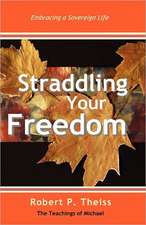Emotional Wellness
Autor Oshoen Limba Engleză Hardback – 2 apr 2007
Osho, one of the most provocative and inspiring spiritual teachers of our time, provides here a practical and comprehensive approach to dealing with this conflict effectively. Incorporating new, never-before-published material, Emotional Wellness leads us to understand the roots of our emotions, to react to situations in a way that can teach us more about ourselves and others, and to respond to life’s inevitable ups and downs with far greater confidence and equilibrium.
Discover:
• The impact that fear, anger, and jealousy have on our lives
• How emotions like guilt, insecurity, and fear are used to manipulate us
• How to break out of unhealthy responses to strong emotions
• How to transform destructive emotions into creative energy
• The role of society and culture on our individual emotional styles
Osho’s unique insight into the human mind and heart goes far beyond conventional psychology. He teaches us to experience our emotions fully and to deal with them creatively in order to achieve a richer, fuller life.
Preț: 117.97 lei
Preț vechi: 140.29 lei
-16% Nou
Puncte Express: 177
Preț estimativ în valută:
22.58€ • 23.51$ • 18.59£
22.58€ • 23.51$ • 18.59£
Carte disponibilă
Livrare economică 11-18 ianuarie 25
Livrare express 28 decembrie 24 - 03 ianuarie 25 pentru 53.96 lei
Preluare comenzi: 021 569.72.76
Specificații
ISBN-13: 9780307337887
ISBN-10: 030733788X
Pagini: 293
Dimensiuni: 164 x 240 x 27 mm
Greutate: 0.53 kg
Editura: HARMONY
ISBN-10: 030733788X
Pagini: 293
Dimensiuni: 164 x 240 x 27 mm
Greutate: 0.53 kg
Editura: HARMONY
Notă biografică
Osho, known for his revolutionary contribution to the science of inner transformation, continues to inspire millions of people worldwide in their search for a new approach to individual spirituality that is self-directed and responsive to the everyday challenges of contemporary life. The Sunday Times of London named him one of the “1,000 Makers of the Twentieth Century,” and novelist Tom Robbins called him “the most dangerous man since Jesus Christ.” For more information about Osho and his work, please visit www.osho.com.
Extras
FIRST THINGS FIRST
The Mechanics of the Mind
Your emotions, your sentiments, your thoughts--the whole paraphernalia of the mind--are manipulated by the outside. Scientifically, it has become more clear now, but even without scientific investigation the mystics have been saying exactly the same thing for thousands of years--that all these things your mind is filled with are not yours; you are beyond them. You get identified with them, and that's the only problem.
For example, somebody insults you and you become angry. You think you are becoming angry, but scientifically speaking the other person's insult is only functioning as a remote control. The person who has insulted you is managing your behavior. Your anger is in his hands; you are behaving like a puppet.
Now scientists are able to put electrodes in the brain at certain centers, and it is almost unbelievable. The mystics have been talking about it for thousands of years, but only recently has science discovered that there are hundreds of centers in the brain controlling all your behavior. An electrode can be put at a particular center--for example, the center for anger. Nobody insults you, nobody humiliates you, nobody says anything to you; you are sitting silently, happily, and somebody pushes a button on a remote control and you become angry! It is a very strange feeling because you cannot see the reason anywhere, why you are becoming angry. Perhaps you will rationalize it somehow. You see a man passing by in the hallway and you remember that he insulted you--you will find some rationalization just to console yourself that you are not going mad. Sitting silently . . . and suddenly feeling so angry without any provocation?
And the same remote controller can work to make you happy. Sitting in your chair you start giggling, and you look all around--if somebody is watching you he will think you are going crazy! Nobody has said anything, nothing has happened, nobody has slipped on a banana peel, so why are you giggling? You will rationalize it, you will try to find some rational grounds for giggling. And the strangest thing is that the next time the same button is pushed and you giggle, you will again come up with the same rationale, the same consolation, the same explanation--not even the rationalization is yours! It is almost like a gramophone record.
When I was reading about the scientific investigations into these centers, I was reminded of my student days. I was a competitor in an inter-university debate; all the universities of the country were participating. The Sanskrit University of Varanasi was also participating, but naturally the students from Sanskrit University were feeling a little inferior compared with competitors from other universities. They knew ancient scriptures, they knew Sanskrit poetry, drama, but they were not familiar with the contemporary world of art, literature, philosophy, or logic. And the inferiority complex works in very strange ways. . . .
After I had spoken, the next person was the representative from Sanskrit University. And just to impress the audience and to hide his inferiority complex, he started his speech with a quotation from Bertrand Russell--he had memorized it, and Sanskrit students are more capable of memorizing things than anybody else. But his stage fright was such . . . he knew nothing about Bertrand Russell, he knew nothing about what he was quoting. It would have been better to have quoted something from Sanskrit, because he would have been more at ease.
In the middle he stopped--just in the middle of a sentence. And I was sitting by his side, because I had just finished. There was silence, and he was perspiring, and just to help him, I said, "Start again"--because what else to do? He was simply stuck. I said, "If you cannot go ahead, start again; perhaps it may come back to you."
So he started again: "Brothers and sisters . . ." and at exactly the same point he got stuck again. Now it became a joke. The whole hall was shouting, "Again!" and he was in such a difficult situation. Neither could he go ahead nor could he keep standing there silent; it would look too idiotic. So he had to start again. But he would start at the very beginning, "Brothers and sisters . . ."
For the whole fifteen minutes we heard only that portion--beginning with "Brothers and sisters . . ." and going up to the point where he got stuck, again and again. When his time was finished he came and sat next to me. He said, "You destroyed my whole thing!"
I said, "I was trying to help you."
He said, "This is help?"
I said, "You were going to be in difficulty anyway. This way at least everybody enjoyed it--except you, that I can understand. But you should rejoice that you made so many people happy! And why did you choose that quotation? When I was saying to you, 'Start again' there was no need to start over from the very beginning--you could have dropped that quotation, there was no need."
But I came to know through reading the scientific research that the speech center is exactly like a gramophone record, but with one thing very strange and special. The moment the needle is taken away from the record you can put the needle back at the spot where you took it from, and go on from there. But in the speech center, when the needle is taken away and put back again, the center instantly goes back to the very beginning.
If this happens, can you say you are the master of what you are saying? Are you the master of what you are feeling? Certainly there are no electrodes implanted in you, but biologically exactly the same work is going on.
You see a certain type of woman, and immediately your mind reacts: "How beautiful!" This is nothing but the remote control. That woman functioned like a remote control attached to an electrode, and your speech center simply went into its recorded speech: "How beautiful!"
The mind is a mechanism. It is not you. It records things from outside, and then reacts to outside situations according to those recordings. That's the only difference between a Hindu and a Mohammedan and a Christian and a Jew--they just have different gramophone records. But inside, it is one humanity. When you play a gramophone record . . . it may be in Hebrew, it may be in Sanskrit, it may be in Persian, it may be in Arabic, but it is the same machine that plays the record. To the machine it does not matter whether it plays Hebrew or Sanskrit.
All your religions, all your political ideas, all your cultural attitudes are nothing but recordings. And in certain situations, certain recordings are provoked.
There is a beautiful incident in the life of one of the wisest kings of India, Raja Dhoj. He was very much interested in wise people. His whole treasury was open only for one purpose--to gather together all the wise people of the country, whatever the cost. His capital was Ujjain, and he had thirty of the country's most famous people in his court. It was the most precious court in the whole country.
One of the greatest poets of the world, Kalidas, was one of the members of the court of Raja Dhoj. One day a man appeared at the court saying that he spoke thirty languages with the same fluency, the same accuracy and accent as any native person could, and he had come to make a challenge: "Hearing that you have in your court the wisest people of the country, here are one thousand gold pieces. Anybody who can recognize my mother tongue, these one thousand gold pieces are his. And if he cannot recognize it, then he will have to give me one thousand gold pieces."
There were great scholars there--and everybody knows that whatever you do, you can never speak any language the way you can speak your own mother tongue, because every other language has to be learned by effort. Only the mother tongue is spontaneous--you don't even learn it, really. It is a result of your whole situation that you simply start speaking it. It has a spontaneity. That's why even the Germans, who call their country "fatherland"--most countries call their land "the motherland"--but even the Germans don't call their language the "father tongue." Every language is called a mother tongue because the child starts learning from the mother. And anyway the father never has the chance to speak in the house! It is always the mother who is speaking; the father is listening.
Many in the court of Raja Dhoj took the challenge. The man spoke in thirty languages--a few pieces in one language, a few pieces in another language--and it was really hard! He was certainly a master artist. He was speaking each language the way only a native can speak his own mother tongue. All of the thirty great scholars lost the contest. The contest continued for thirty days, and every day one person took the challenge and lost it. They would guess, and the man would say, "No, this is not my mother tongue."
On the thirty-first day . . . King Dhoj had been continually saying to Kalidas, "Why don't you take up the challenge? Because a poet knows language in a more delicate way, with all its nuances, more than anybody else." But Kalidas remained silent. He had been watching for thirty days, trying to determine which language the man spoke with more ease, with more spontaneity, with more joy. But he had not been able to find any difference, the man spoke all the languages in exactly the same way.
On the thirty-first day, Kalidas asked King Dhoj and all the wise people to stand outside in front of the hall. There was a long row of steps, and the man was coming up; as he came up to the last step, Kalidas pushed him down. And as he fell rolling down the steps, anger came up--he shouted.
Kalidas said, "This is your mother tongue!" Because in anger you cannot remember, and the man had not been expecting this tactic to be used in the contest. And that actually was his mother tongue. Deepest in his mind, the recording was of the mother tongue.
One of my professors used to say--he had lived all over the world, teaching in different universities--"Only in two situations in life have I been in difficulty in other countries, and those are when I was fighting or falling in love. In those times, one needs one's mother tongue. However beautifully you express your love in another language, it is not the same, it seems superficial. And when you are angry and fighting in somebody else's language, you cannot have that same joy . . ." He said, "Those are two very significant situations--fighting and loving--and mostly they are together with the same person! With a person you are in love, and with that same person you have to fight."
And he was right to say that everything in a language that you have learned remains superficial--you can neither sing a beautiful song nor can you use the real four-letter words of your own language. In both cases, it remains lukewarm.
The mind certainly is a mechanism for recording experiences from the outside, and reacting and responding accordingly. It is not you. But unfortunately the psychologists think the mind is all, and beyond mind there is nothing. That means you are nothing but a collection of impressions from the outside; you don't have any soul of your own. Even the very idea of the soul is given by the outside.
This is where the mystics differ. They will agree absolutely with the contemporary scientific research about the mind. But it is not right about the human being's totality. Beyond the mind, there is an awareness that is not given by the outside, and is not just an idea--and there is no experiment up to now that has found any center in the brain that corresponds to awareness.
The whole work of meditation is to make you aware of all that is mind, and disidentify yourself from it. When the mind is angry, you can realize that it is simply a gramophone record. When the mind is sad, you can simply remember that it is only a gramophone record. A certain situation is pressing the remote control and you feel sad, you feel angry, you feel frustrated, you feel worried, you feel tense--all these things are coming from the outside and the mind is responding to them. But you are the watcher, you are not the actor. It is not your reaction.
Hence the whole art of meditation is to learn awareness, alertness, consciousness. While you are feeling angry, don't repress it; let it be there. Just become aware. See it as if it is some object outside you. Slowly go on cutting your identifications with the mind. Then you have found your real individuality, your being, your soul.
Finding this awareness is enlightenment--you have become luminous. You are no longer in darkness, and you are no longer just a puppet in the hands of the mind. You are a master, not a servant. Now the mind cannot react automatically, autonomously, the way it used to do before. It needs your permission. If somebody insults you and you don't want to be angry, then you don't become angry.
Gautam Buddha used to say to his disciples, "To be angry is so stupid that it is inconceivable that intelligent human beings go on doing it. Somebody else is doing something and you are getting angry? He may be doing something wrong, he may be saying something wrong, he may be making some effort to humiliate you, to insult you--but that is his freedom. If you react, you are a slave. If you say to the person, 'It is your joy to insult me, it is my joy not to be angry,' you are behaving like a master."
Unless this master becomes crystal clear in you, crystallized, you don't have any soul. You are just a phonograph record, and as you grow older your recording goes on expanding. You become more knowledgeable, and people think you are becoming wiser--you are simply becoming a donkey loaded with books.
Wisdom consists only of one thing--not of knowing many things but of knowing only one thing, and that is your awareness and its separation from the mind.
Just try watching in small things, and you will be surprised. People go on doing the same things every day. They go on deciding to do something, and they go on repenting because they have not done it; it becomes a routine.
The Mechanics of the Mind
Your emotions, your sentiments, your thoughts--the whole paraphernalia of the mind--are manipulated by the outside. Scientifically, it has become more clear now, but even without scientific investigation the mystics have been saying exactly the same thing for thousands of years--that all these things your mind is filled with are not yours; you are beyond them. You get identified with them, and that's the only problem.
For example, somebody insults you and you become angry. You think you are becoming angry, but scientifically speaking the other person's insult is only functioning as a remote control. The person who has insulted you is managing your behavior. Your anger is in his hands; you are behaving like a puppet.
Now scientists are able to put electrodes in the brain at certain centers, and it is almost unbelievable. The mystics have been talking about it for thousands of years, but only recently has science discovered that there are hundreds of centers in the brain controlling all your behavior. An electrode can be put at a particular center--for example, the center for anger. Nobody insults you, nobody humiliates you, nobody says anything to you; you are sitting silently, happily, and somebody pushes a button on a remote control and you become angry! It is a very strange feeling because you cannot see the reason anywhere, why you are becoming angry. Perhaps you will rationalize it somehow. You see a man passing by in the hallway and you remember that he insulted you--you will find some rationalization just to console yourself that you are not going mad. Sitting silently . . . and suddenly feeling so angry without any provocation?
And the same remote controller can work to make you happy. Sitting in your chair you start giggling, and you look all around--if somebody is watching you he will think you are going crazy! Nobody has said anything, nothing has happened, nobody has slipped on a banana peel, so why are you giggling? You will rationalize it, you will try to find some rational grounds for giggling. And the strangest thing is that the next time the same button is pushed and you giggle, you will again come up with the same rationale, the same consolation, the same explanation--not even the rationalization is yours! It is almost like a gramophone record.
When I was reading about the scientific investigations into these centers, I was reminded of my student days. I was a competitor in an inter-university debate; all the universities of the country were participating. The Sanskrit University of Varanasi was also participating, but naturally the students from Sanskrit University were feeling a little inferior compared with competitors from other universities. They knew ancient scriptures, they knew Sanskrit poetry, drama, but they were not familiar with the contemporary world of art, literature, philosophy, or logic. And the inferiority complex works in very strange ways. . . .
After I had spoken, the next person was the representative from Sanskrit University. And just to impress the audience and to hide his inferiority complex, he started his speech with a quotation from Bertrand Russell--he had memorized it, and Sanskrit students are more capable of memorizing things than anybody else. But his stage fright was such . . . he knew nothing about Bertrand Russell, he knew nothing about what he was quoting. It would have been better to have quoted something from Sanskrit, because he would have been more at ease.
In the middle he stopped--just in the middle of a sentence. And I was sitting by his side, because I had just finished. There was silence, and he was perspiring, and just to help him, I said, "Start again"--because what else to do? He was simply stuck. I said, "If you cannot go ahead, start again; perhaps it may come back to you."
So he started again: "Brothers and sisters . . ." and at exactly the same point he got stuck again. Now it became a joke. The whole hall was shouting, "Again!" and he was in such a difficult situation. Neither could he go ahead nor could he keep standing there silent; it would look too idiotic. So he had to start again. But he would start at the very beginning, "Brothers and sisters . . ."
For the whole fifteen minutes we heard only that portion--beginning with "Brothers and sisters . . ." and going up to the point where he got stuck, again and again. When his time was finished he came and sat next to me. He said, "You destroyed my whole thing!"
I said, "I was trying to help you."
He said, "This is help?"
I said, "You were going to be in difficulty anyway. This way at least everybody enjoyed it--except you, that I can understand. But you should rejoice that you made so many people happy! And why did you choose that quotation? When I was saying to you, 'Start again' there was no need to start over from the very beginning--you could have dropped that quotation, there was no need."
But I came to know through reading the scientific research that the speech center is exactly like a gramophone record, but with one thing very strange and special. The moment the needle is taken away from the record you can put the needle back at the spot where you took it from, and go on from there. But in the speech center, when the needle is taken away and put back again, the center instantly goes back to the very beginning.
If this happens, can you say you are the master of what you are saying? Are you the master of what you are feeling? Certainly there are no electrodes implanted in you, but biologically exactly the same work is going on.
You see a certain type of woman, and immediately your mind reacts: "How beautiful!" This is nothing but the remote control. That woman functioned like a remote control attached to an electrode, and your speech center simply went into its recorded speech: "How beautiful!"
The mind is a mechanism. It is not you. It records things from outside, and then reacts to outside situations according to those recordings. That's the only difference between a Hindu and a Mohammedan and a Christian and a Jew--they just have different gramophone records. But inside, it is one humanity. When you play a gramophone record . . . it may be in Hebrew, it may be in Sanskrit, it may be in Persian, it may be in Arabic, but it is the same machine that plays the record. To the machine it does not matter whether it plays Hebrew or Sanskrit.
All your religions, all your political ideas, all your cultural attitudes are nothing but recordings. And in certain situations, certain recordings are provoked.
There is a beautiful incident in the life of one of the wisest kings of India, Raja Dhoj. He was very much interested in wise people. His whole treasury was open only for one purpose--to gather together all the wise people of the country, whatever the cost. His capital was Ujjain, and he had thirty of the country's most famous people in his court. It was the most precious court in the whole country.
One of the greatest poets of the world, Kalidas, was one of the members of the court of Raja Dhoj. One day a man appeared at the court saying that he spoke thirty languages with the same fluency, the same accuracy and accent as any native person could, and he had come to make a challenge: "Hearing that you have in your court the wisest people of the country, here are one thousand gold pieces. Anybody who can recognize my mother tongue, these one thousand gold pieces are his. And if he cannot recognize it, then he will have to give me one thousand gold pieces."
There were great scholars there--and everybody knows that whatever you do, you can never speak any language the way you can speak your own mother tongue, because every other language has to be learned by effort. Only the mother tongue is spontaneous--you don't even learn it, really. It is a result of your whole situation that you simply start speaking it. It has a spontaneity. That's why even the Germans, who call their country "fatherland"--most countries call their land "the motherland"--but even the Germans don't call their language the "father tongue." Every language is called a mother tongue because the child starts learning from the mother. And anyway the father never has the chance to speak in the house! It is always the mother who is speaking; the father is listening.
Many in the court of Raja Dhoj took the challenge. The man spoke in thirty languages--a few pieces in one language, a few pieces in another language--and it was really hard! He was certainly a master artist. He was speaking each language the way only a native can speak his own mother tongue. All of the thirty great scholars lost the contest. The contest continued for thirty days, and every day one person took the challenge and lost it. They would guess, and the man would say, "No, this is not my mother tongue."
On the thirty-first day . . . King Dhoj had been continually saying to Kalidas, "Why don't you take up the challenge? Because a poet knows language in a more delicate way, with all its nuances, more than anybody else." But Kalidas remained silent. He had been watching for thirty days, trying to determine which language the man spoke with more ease, with more spontaneity, with more joy. But he had not been able to find any difference, the man spoke all the languages in exactly the same way.
On the thirty-first day, Kalidas asked King Dhoj and all the wise people to stand outside in front of the hall. There was a long row of steps, and the man was coming up; as he came up to the last step, Kalidas pushed him down. And as he fell rolling down the steps, anger came up--he shouted.
Kalidas said, "This is your mother tongue!" Because in anger you cannot remember, and the man had not been expecting this tactic to be used in the contest. And that actually was his mother tongue. Deepest in his mind, the recording was of the mother tongue.
One of my professors used to say--he had lived all over the world, teaching in different universities--"Only in two situations in life have I been in difficulty in other countries, and those are when I was fighting or falling in love. In those times, one needs one's mother tongue. However beautifully you express your love in another language, it is not the same, it seems superficial. And when you are angry and fighting in somebody else's language, you cannot have that same joy . . ." He said, "Those are two very significant situations--fighting and loving--and mostly they are together with the same person! With a person you are in love, and with that same person you have to fight."
And he was right to say that everything in a language that you have learned remains superficial--you can neither sing a beautiful song nor can you use the real four-letter words of your own language. In both cases, it remains lukewarm.
The mind certainly is a mechanism for recording experiences from the outside, and reacting and responding accordingly. It is not you. But unfortunately the psychologists think the mind is all, and beyond mind there is nothing. That means you are nothing but a collection of impressions from the outside; you don't have any soul of your own. Even the very idea of the soul is given by the outside.
This is where the mystics differ. They will agree absolutely with the contemporary scientific research about the mind. But it is not right about the human being's totality. Beyond the mind, there is an awareness that is not given by the outside, and is not just an idea--and there is no experiment up to now that has found any center in the brain that corresponds to awareness.
The whole work of meditation is to make you aware of all that is mind, and disidentify yourself from it. When the mind is angry, you can realize that it is simply a gramophone record. When the mind is sad, you can simply remember that it is only a gramophone record. A certain situation is pressing the remote control and you feel sad, you feel angry, you feel frustrated, you feel worried, you feel tense--all these things are coming from the outside and the mind is responding to them. But you are the watcher, you are not the actor. It is not your reaction.
Hence the whole art of meditation is to learn awareness, alertness, consciousness. While you are feeling angry, don't repress it; let it be there. Just become aware. See it as if it is some object outside you. Slowly go on cutting your identifications with the mind. Then you have found your real individuality, your being, your soul.
Finding this awareness is enlightenment--you have become luminous. You are no longer in darkness, and you are no longer just a puppet in the hands of the mind. You are a master, not a servant. Now the mind cannot react automatically, autonomously, the way it used to do before. It needs your permission. If somebody insults you and you don't want to be angry, then you don't become angry.
Gautam Buddha used to say to his disciples, "To be angry is so stupid that it is inconceivable that intelligent human beings go on doing it. Somebody else is doing something and you are getting angry? He may be doing something wrong, he may be saying something wrong, he may be making some effort to humiliate you, to insult you--but that is his freedom. If you react, you are a slave. If you say to the person, 'It is your joy to insult me, it is my joy not to be angry,' you are behaving like a master."
Unless this master becomes crystal clear in you, crystallized, you don't have any soul. You are just a phonograph record, and as you grow older your recording goes on expanding. You become more knowledgeable, and people think you are becoming wiser--you are simply becoming a donkey loaded with books.
Wisdom consists only of one thing--not of knowing many things but of knowing only one thing, and that is your awareness and its separation from the mind.
Just try watching in small things, and you will be surprised. People go on doing the same things every day. They go on deciding to do something, and they go on repenting because they have not done it; it becomes a routine.










